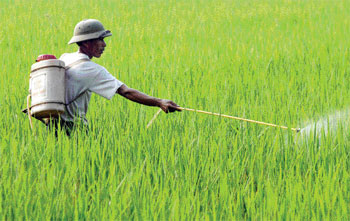Unscientific report jeopardises agro-chemical imports
Gamini WARUSHAMANA
The controversial report presented by a group of scientists of the
Kelaniya University on the arsenic content in rice and its affinity to
the high incidence of kidney diseases in several areas in the Dry Zone
has jeopardised essential agro-chemical imports. This would adversely
affect the Maha season paddy cultivation, said agro-chemical importers.
Croplife, the organisation representing agro-chemical importers said
that this unscientific report has misled the public as well as
influential groups. As a consequence of this report large stocks of
pesticides and weedicides imported are now held at Sri Lanka Customs.
Unless this mess created by them comes to an end, the agriculture sector
will be affected, they said.
|

Application of agro-chemicals |
Croplife officials said that they have come to their conclusions
after a dialogue with the gods as they have said, and not by acceptable
scientific research. Therefore they totally reject the contents of the
report.
Agro-chemicals are manufactured under WHO and WFO guidelines and
accepted international standards. Nowhere in the world are
agro-chemicals produced with arsenic as an active ingredient. On the
other hand, pesticides with arsenic as an active ingredient cannot be
imported into Sri Lanka under the Control of Pesticides Act, No.33 of
1980 and amended in 1994. The import of pesticides is controlled by the
Registrar of Pesticides and all imports are tested to ensure that they
meet the standards required by the country, they said.
The annual demand for pesticides in the country is around 7,000
tonnes and it takes three months to receive stocks after placing an
order. Therefore, changes in the supply chain would adversely affect the
agriculture sector and the whole economy.
Croplife accepted that arsenic was found in small quantities in a few
pesticide samples tested by the Industrial Technology Institute.
However, these levels are much lower than the permissible levels of
arsenic established by the SLSI for food items such as biscuits,
chocolates, jam and cordial which are directly consumed.
Arsenic can be added into these food items or even to pesticides
through other ingredients or water. This unscientific report has grossly
exaggerated the facts. As a result of excessive publicity, a shipment of
our rice exported to Turkey is held up on suspicion of containing
arsenic. This kind of false campaign will damage the government's effort
to increase rice consumption against wheat flour consumption.
The report released by scientists led by Prof. Nalin Silva said that
chronic kidney diseases prevalent in the Anuradhapura, Polonnaruwa
districts and Dehiattakandiya areas is a result of the arsenic content
in rice.
Arsenic has come into rice from pesticides applied to paddy fields.
They have further claimed that in 28 pesticides arsenic and mercury were
available in excessive amounts, a spokesman for Croplife said. |

